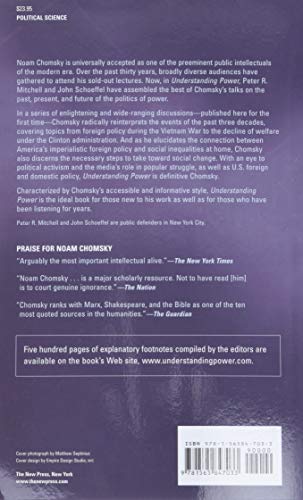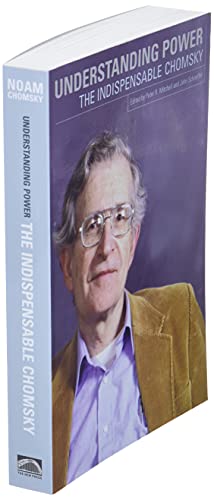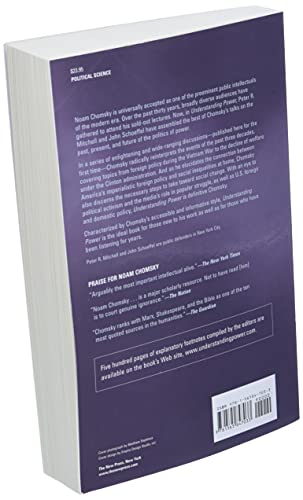Customer Services
Copyright © 2025 Desertcart Holdings Limited
Desert Online General Trading LLC
Dubai, United Arab Emirates





Understanding Power: The Indispensable Chomsky
J**H
"Mister Natural" Speaks to Flaky Foont
"Well, Foont, Canada..." That's the way many of his talks or in this case his responses begin. "Well," or "So in my view," or "Look," or even "This point has been understood forever, actually." In other words, the famous M.I.T. professor, the scientist, teacher, social historian and philosopher, reveals himself as an accessible human being who -- despite being one of the world's celebrated linguists -- speaks in simple, ordinary language. Anybody can understand him. He is not one of the speaking heads, the pundits, and neither does he direct himself to them: he is -- like Diogenese the cynic, or Socratese -- a street philosopher ready to mix-it-up with passers-by, for the sake of the soul of the City.This book is, as the Amazons say, a compilation of transcripts from his speeches and seminars given around the country over more than a decade. Indeed, sewing the thing together must have been a challenge in and of itself, disregarding the constant hope that the spirit or breath of the speaker might survive and live within the patched-up and improvised body. But, it does, somehow, though two or three times in the first half of POWER I felt myself skidding over what appeared to be ver batim repetitions of phrase as well as whole paragraphs, like rows of upraised sutures at the joints. Distracting, but far from crucial. Anyway, the editors post this notice on the back cover: "FIVE HUNDRED PAGES OF EXPLANATORY FOOTNOTES COMPILED BY THE EDITORS WILL BE AVAILABLE ON THE BOOK'S WEBSITE, [...]" Which means you can check anything he says at any point.Is UNDERSTANDING POWER worth reading? I think so. Is it entertaining? I believe it is. Is it informative? Ohhhh yes! What's the point? The point is to wake you up, Neo, or Flaky, so that you can brush the scales from your eyes, "Rise and look around you, and you'll see who you are." And what you're part of.But rather than to describe further a book nearly everybody on the site has described adequately and in detail, let me offer you a snippet of Chomsky: A man in the audience calls out, "It seems to me that in Canada, the fact that they have a labor party makes people somewhat more attuned to issues that Americans largely miss, like worker's issues for example." Chomsky responds, "That's right -- Canada's an interesting case. It's a pretty similar society to us, except different somehow. It's much more humane. It has the same corporate rule, the same capitalist institutions, all of that's the same -- but its just a much more humane place. They have a kind of social contract that we don't have, like they have this national health-care system which makes us look bad because its so efficient. And that IS related to their having a labor-based party, I think. The New Democratic Party in Canada (N.D.P.) isn't really a labor party, but its kind of labor-based. However, that party's ability to enter the political system in Canada wasn't a result of having proportioal representation, it was due to the same thing that would be necessary to get any kind of change like proportional representation in the first lace: a lot of serious popular organizing."You don't have to be any kind of scientist. Anybody can understand what he's talking about. His range of subject matter is wider than the questions and responses he's offered. Animal Rights? On page 357 it seemed for an instant he'd channeled The Buddah. And (Fall down!) he did, namelessly, in spirit. Newt Gingrich? "Newt Gingrich and the rest of those people may talk about supporting 'family values,' but they actually want families destroyed -- because families are not rational from the point of view of profit-making." P. 363. Welfare for the Rich as opposed to Welfare for the Poor, and what George Herbert Walker Bush called "The New World Order." He says, "What's been happenign in the contemporary period is really somethign quite new in history, actually. I mean, in recent years a completely new form of government is being pioneered, one designed to serve the deveoping needs of this new international corprate ruling class -- it's what has sometimes been called an emerging 'de facto world government.' P. 381. And at about that point, near tne end, he brings us up to speed on the financial collapse we've only just narrowly squeaked by, and sketches its inevitable reprocussions, as we sit, terrified to find ourselves robbed of all our cash and awaiting the next move(s) of those few, invisible rich individuals who having stolen our money (Goldlman Sachs) will now rule our lives in fact.Unbelievable!
L**C
Oppression. Horrors. Misdeeds. A controversial world view
Noam Chomsky is a professor of linguistics at MIT and, over his lifetime, has become increasingly outspoken in left-wing views about American foreign policy. This book is a compilation of transcripts of his question/answer discussions on college campuses and lecture halls between the years 1989 and 1999. The focus is on the politics of power in general, and the United States Government and the media in particular. His words are low-key and conversational and yet they carry a sharp sting as he reinterprets events over the past 35 years. In addition to the 401-pages of the book, there are 500 more pages of footnotes on the Internet.I found the book fascinating reading. My eyes stayed glued to the page and I found myself stopping often to think about his seemingly simple statements. I learned a lot. And some of it was hard to take because it made me look critically at my own view of the world and broke up many of my preconceived ideas. If anything, he demonstrates that there are many sides to every question. And I had never taken a careful look at his side before.Most of it was easy to follow. However, a lot had to do with economics, which I always find confusing. I therefore have no idea whether his arguments on this topic are valid or not. But when it comes to human nature, I'm an expert. I understand the greed, the desire for power and the horrendous amount of death and destruction that has always existed. I also understand the need to try to fight oppressive forces and make the world a better place to live. This is what Professor Chomsky wants to happen. He gives examples of progress we've made in the past that might have seemed impossible at another time. For example, in 1790, it didn't seem that slavery would ever end. And we've come a long way in the United States in the elimination of segregation and the advance of women's rights. Environmental issues are also beginning to be addressed. This gives Professor Chomsky's audiences hope.But most of the book turned a flashlight on the horrors in the world. And it bothers me that he blames it all on the United States. Surely, the world's ills existed long before the Declaration of Independence was even formulated. The American government, itself, is based on positive ideals. Yes, we have been responsible for many misdeeds. But where, but in America, would Professor Chomsky be able to be so outspoken in his criticism? In some places of the world, he would be met with a firing squad instead of an audience who cherish his every word.The book raised a lot of questions for me. And, after careful reflection I can only say that I partially agree with some of his conclusions. Some don't quite ring true. And others just seem wrong. The problem is that he seems to believe his conclusions first and then finds the facts to support his beliefs. As I could never have the battery of facts at my fingertips to debate him, or the personality for debate, I cannot make any statements of the "truths" of his convictions. That doesn't mean, however, that he didn't open my mind to new possibilities.This book is certainly worth reading and I highly recommend it. It engaged my mind and stimulated my thinking. I don't believe there are easy answers and, in fact, neither does Professor Chomsky. As a matter of fact he purposely refuses to give any concrete proposals for rectifying the situations he discusses. Basically, he's just opening our minds. And perhaps that is enough.
C**D
This book changed my life
This is the best book I have ever read. It's the only book where, just the act of reading it expands your mind. Chomsky takes an issue, or a past event, or an idea, and breaks it down into so many different parts. He has an incredible way of helping you think more thoroughly. This book shows the truth about important subjects that are rarely touched upon by any traditional scholarly resources. This is essential reading for anyone wanting to see what the USA is really all about.
A**Y
Amazing, informative but quite scary
This book is excellent and details all sorts of information on events that don't really make the main stream news and are hidden from most people. He has diligently read from vast numbers of sources, including government papers released to the public. It is frightening though when you read about how little governments care about people and are only interested in their own power and wealth. Not that this is a surprise but nevertheless it is still a bit astonishing.
H**L
Essential reading!
I would describe this book as a real eye opener for myself. One question which immediately arises is - why do I not know about this stuff. I feel like I have had the wool pulled over my eyes; and, of course, this is probably one of the reasons that Chomsky does what he does. He acts as a medium to channel the `undesirable` information to the people. Actually this is not secret classified information, but rather just stuff which the system tends not to publish, for whatever reason. I have also been watching Chomsky videos and he delivers incredibly lucid and fluent talks on all kinds of matters and I have discovered other books I would like to read, like `Pedagogy of the oppressed` by Paolo Freire. `Understanding Power` has changed my world view considerably. It may not be for the faint hearted as it may easily shatter any illusions that we may be living under.Something that for me is particularly compelling is the way in which this book seems to connect so much of the fragmented impressions and conceptions in my own mind. It really makes you question the influences, for example the media, which have reached you and the way in which they may have worked to indoctrinate and control you. This is really hugely important! Again,why have I not come across this kind of information before? Yes indeed, why is itself an interesting question. This has to be a must read for everyone!
A**R
Fantastic Chomsky
Chomsky at his best. A vast collection of transcripts, meticulously linked and referenced. David Martin’s review says it all but there are perhaps a couple of extra points worth making. The references to the book are on the web and are vast. Had they been included in full within the book, it would have looked like the Encyclopaedia Britannica. This is a book that should be treated as a reference rather than read from cover to cover (although there’s nothing to stop you doing that). It has a comprehensive index and covers just about all the topics you would expect from this “indispensable” political activist and clear thinker.
A**R
Authoritative discussion of power in the Western world
Transcripts from a series of seminars to 1999, this is a wide ranging and authoritative consideration of how, where, and why power is exercised in Western democracy. Interesting to read in the context of what has happened since.
S**N
One of the great minds of our time
A great introduction to Chomsky. This was my first book by one of the great minds of our time, I've probably own at least a dozen now...
Trustpilot
2 months ago
5 days ago
3 days ago
2 days ago